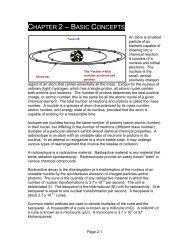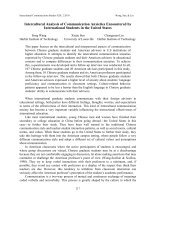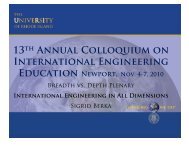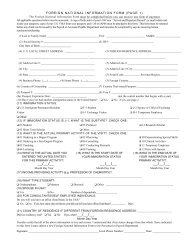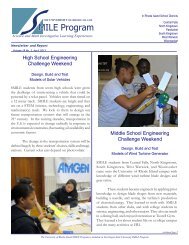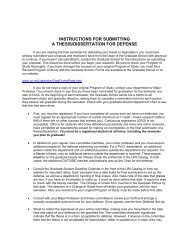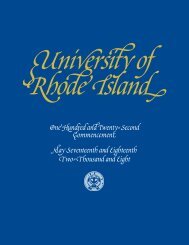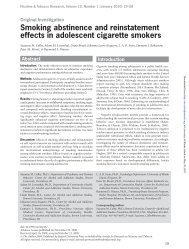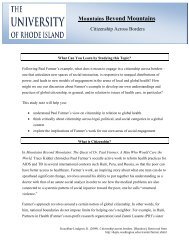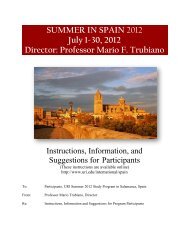asian approaches to human communication - University of Rhode ...
asian approaches to human communication - University of Rhode ...
asian approaches to human communication - University of Rhode ...
You also want an ePaper? Increase the reach of your titles
YUMPU automatically turns print PDFs into web optimized ePapers that Google loves.
Intercultural Communication Studies XII-4 2003 Asian Approaches <strong>to</strong> Human Communication<br />
contexts <strong>of</strong> Asia. To theorize from the vantage point <strong>of</strong> Asians as centered is<br />
thus <strong>to</strong> theorize from Asian everyday languages, religious-philosophical<br />
traditions, and his<strong>to</strong>rical experiences as vital resources.<br />
European intellectual imperialism, which results in the intellectual<br />
dislocation <strong>of</strong> non-Europeans, has been increasingly problematized and<br />
challenged across disciplines in recent years (Asante, 1992, 1998, 2002, 2003).<br />
The field <strong>of</strong> <strong>communication</strong> cannot escape from this interdisciplinary intellectual<br />
movement. Many researchers, Asian and non-Asian alike, in the field have<br />
assumed the universal applicability <strong>of</strong> the metatheory and methodology <strong>of</strong><br />
Eurocentric <strong>communication</strong> scholarship. In the case <strong>of</strong> knowledge production<br />
about Asian <strong>communication</strong> practices, they have done extensive research<br />
through analytical <strong>to</strong>ols grounded in European intellectual traditions. Although<br />
some <strong>of</strong> their findings are insightful and useful, such Eurocentric studies <strong>of</strong><br />
Asian <strong>communication</strong> have <strong>of</strong>ten dislocated Asians out <strong>of</strong> their cultural context<br />
and have thereby denied the centrality <strong>of</strong> Asians in the <strong>communication</strong> process.<br />
One <strong>of</strong> the urgent tasks <strong>of</strong> Asian <strong>communication</strong> scholars at this critical<br />
juncture is <strong>to</strong> conduct Asiacentric studies <strong>of</strong> Asian <strong>communication</strong>. They are<br />
now prodded <strong>to</strong> engage in <strong>human</strong> <strong>communication</strong> scholarship whose concepts,<br />
models, and principles are derived from Asian cultures as resources for theory<br />
building. In an attempt <strong>to</strong> propound an alternative metatheory that guides such<br />
Asiacentric inquiries in<strong>to</strong> Asian <strong>communication</strong>, the present essay stipulates its<br />
research objectives, content dimensions, and methodological considerations.<br />
These three components <strong>of</strong> the metatheory specify why, how, and what kind <strong>of</strong><br />
communicative knowledge from Asia ought <strong>to</strong> be pursued. Along with the<br />
theoretical assumptions outlined elsewhere (Miike, 2002, 2003ab), they envision<br />
the con<strong>to</strong>urs <strong>of</strong> an Asiacentric <strong>communication</strong> paradigm. 1<br />
Asiacentric Research Objectives<br />
In this first section, I wish <strong>to</strong> address why (or for what purpose) knowledge<br />
should be produced in Asiacentric <strong>communication</strong> scholarship. There are five<br />
Asiacentric research objectives that I would like <strong>to</strong> discuss herein: (1) <strong>to</strong> critique<br />
misleading Eurocentric studies <strong>of</strong> Asian <strong>communication</strong> behaviors; (2) <strong>to</strong> preserve<br />
Asian cultural values and modes <strong>of</strong> <strong>communication</strong>; (3) <strong>to</strong> explore spiritual<br />
liberation through <strong>communication</strong>; (4) <strong>to</strong> depict multiple visions <strong>of</strong> harmony<br />
among complex relationships; and (5) <strong>to</strong> examine (inter)cultural <strong>communication</strong><br />
needs and problems seen through Asian eyes. These interrelated research<br />
goals are designed <strong>to</strong> systematically advance the Asiacentric knowledge <strong>of</strong><br />
<strong>human</strong> <strong>communication</strong>.<br />
The first Asiacentric research objective is <strong>to</strong> critique misleading Eurocentric<br />
studies <strong>of</strong> Asian <strong>communication</strong> behaviors. Asiacentric critics need <strong>to</strong><br />
40




